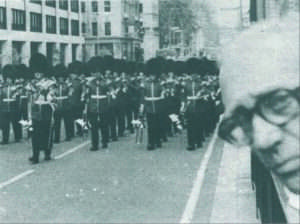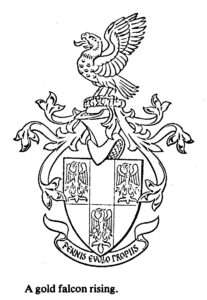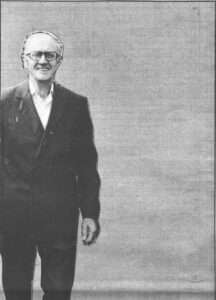My Father’s Hands
(First published in the Townships Sun, June 1982)
by Bernard Epps
(A couple of years ago, I wrote a piece about my mother called “A Wartime Christmas.” When someone told me “I cried when I read that,” I was delighted because I’d cried when I’d written it, and only regretted I hadn’t written it when my mother was alive to see it.
Since Father’s Day was coming up, I asked the Townships Sun if I might do something for the June issue about my father while he was still hale and hearty. I’d only just finished the first rough draft when news came that he had collapsed and died while preparing his garden for spring planting. I was too late once more.)
| My father’s hands were huge and heavy—great brown paws hanging from the ends of his arms like boxers’ mitts. The fingers were thick and blunt, the ball of the thumb and the heel of the hand like meaty wedges and the veins standing out on the backs like roots of trees. He always pared his nails with a jack knife because ordinary scissors or nail clippers were far too puny for such work. Those hands were made for swinging a sledge. |  |
Yet my father’s hands were always busy making things or growing things. The things he made would fill a Sears catalogue—everything from barns to bridges, fishponds to fire-engines, model airplanes, wall plaques, doll houses and septic tanks, roads and clocks and cigarette lighters, jewel boxes, furniture, bird houses—the list goes on and on and on. My father left many more things in the world than were here when he arrived. The last things he made were a varnished oak nameplate slung from wrought iron brackets on his garage and a tiny model barrel organ that played “Greensleeves” when you turned the crank.
My father’s hands were also growing things that other people couldn’t ― those thick thumbs tucking bulbs in the soil or planting seeds of a thousand sorts ― flowers and shrubs, fruits and vegetables and trees. His little house in Kingston Mills, Ontario, was surrounded by lawns and flower beds, rock gardens and rose trellises, windmills and weather vanes, a sundial and a wishing well. His greenhouse was always full of growing things and sometimes he’d take a chair out there to just sit among his plants.
He was born more than 77 years ago among the old mossed stones, the flower gardens and fruit orchards of Kent in England. His father ― and his father’s fathers as far back as anyone cares to go ― were country folk working the fields and farms, tending the hops or minding the sheep on the downs or in the marshes. Those who know about such things have written that the family name comes from the Romney Marshes and derives from ‘Ib’s, a medieval contraction of “Isabel’s.” Those who know about such things are too polite to mention that the reason a man would be called “Isabel’s” instead of “William’s” or “Peter’s,” “John’s son” or “Stephen’s son,” was because his paternity was in doubt. Despite this early illegitimacy, this original sin, the family somehow acquired a coat of arms. It is described in that inimitable heraldic poetry as: Of six pieces Gules and Or, three eagles displayed Or, and for Crest: On a chaplet Vert, flowered Or, a gold falcon rising.
 A drawing of those arms in the Bodlean Library at Oxford is labelled, “The Armes and Creast of the Auntient Family of Epes, of the county of Kent where they have inhabited for many generations: From whome is discended as chiefe heire Male of the sayd house Mr. Allen Epes, now livinge in the Isle of Thanet in the sayd county. At whose request I have exemplified, ratified and confirmed theis Armes and Creast to him, his posteritie, and family, with their due differences forever. By power and aucthoritie of myne Office of principall King of Armes of England, to me comitted by lettres patentes under his Mates Seale great of England. Willm Segar, Garter principall King of Armes.”
A drawing of those arms in the Bodlean Library at Oxford is labelled, “The Armes and Creast of the Auntient Family of Epes, of the county of Kent where they have inhabited for many generations: From whome is discended as chiefe heire Male of the sayd house Mr. Allen Epes, now livinge in the Isle of Thanet in the sayd county. At whose request I have exemplified, ratified and confirmed theis Armes and Creast to him, his posteritie, and family, with their due differences forever. By power and aucthoritie of myne Office of principall King of Armes of England, to me comitted by lettres patentes under his Mates Seale great of England. Willm Segar, Garter principall King of Armes.”
In the floor of a church in Old Romney is a small brass plaque dating from the early fifteenth century inscribed, “Pray for the soules of John Ips and Margaret his wife on whois Almighti ihu have mercy Amen.”
“Alan Eps” of New Romney (the harbour of the old one silted up) made a will in 1471 and “William Epes” served seven times as mayor of that town while “Thomas Epps” was twice mayor and a baron of the Cinque Ports.
Oxford University’s Dictionary of National Biography lists two homeopathic physicians named Epps ― one of whom wrote a book entitled Evidence of Christianity deduced from Phrenology ― which drove the family back into obscurity where it belonged.
My father had no use for such nonsense. He was a man of the soil always ready to deflate the pompous with a quip, and, if things got too solemn, he’d reach into his fund of comic songs from the Edwardian music halls. One that springs immediately to mind is about “the ’obnailed boots that me father wore.” It begins by admitting that “me father’s feet took up all the street, and ’is boots was in proportion” and goes on to:
“Kate and Flo went to Blackpool
With the money they’d been saving.
Father’s boot was seen
As a bathing machine ―
In it they undressed for bathing.
But while they were undressing, they forgot, I’m sure,
The ’ole father cut for ’is corn ― Oh, Lor’!
And the kids were giggling at the things they saw
In the ’obnailed boot that me father wore.”
Another posed a knotty philosophical question that might have kept medieval monks arguing for centuries:
“What did the poor little moths live on When Adam and Eve were here?
Adam had no trousers;
Eve, she had no blouses…”
 And if the party got dull, he’d sometimes don his stetson and a shoulder-length wig. He always gave his height to officials as “five-foot eleven and fifteen-sixteenths” and his age as “seventy-seven. I would ’ave been seventy-eight but I ’ad the measles.” On the wall of his house there hung the head of an insane Korean with a necktie suspended underneath. Pull on the tie and the Korean would spit full in your face, roll his eyes, stick out his tongue and laugh maniacally for a good two minutes.
And if the party got dull, he’d sometimes don his stetson and a shoulder-length wig. He always gave his height to officials as “five-foot eleven and fifteen-sixteenths” and his age as “seventy-seven. I would ’ave been seventy-eight but I ’ad the measles.” On the wall of his house there hung the head of an insane Korean with a necktie suspended underneath. Pull on the tie and the Korean would spit full in your face, roll his eyes, stick out his tongue and laugh maniacally for a good two minutes.
My father also had a wristwatch someone had given him—one of those quartz-regulated, battery-operated micro-computers that not only provided the day, date, hour, minute and second but could serve as a stopwatch too, and sound an alarm with the first dozen bars of “Waltzing Matilda.” Since my father never did quite figure out how to work this watch, the alarm was always going off at odd moments. He’d be sitting in a restaurant or a bar, riding in an airplane or standing in line at the bank, and he’d suddenly start playing “Waltzing Matilda.” People would turn around to stare at him and he’d turn round, too, pretending he didn’t know where that strange music was coming from.
The minister who conducted the funeral service had never met my father (since my father was never much where ministers might be if he could help it) and droned solemnly on and on while repeatedly referring to him as “Mr. Epp.”
When he was finally done and we stood a moment staring at the coffin, some of us couldn’t help smiling for we imagined we heard that alarm go off inside his box,
“Waltzing Matilda, Waltzing Matilda, Who’ll come a-waltzing Matilda with me?”


A wonderful story well written. I look forward to reading the set of books I am ordering.